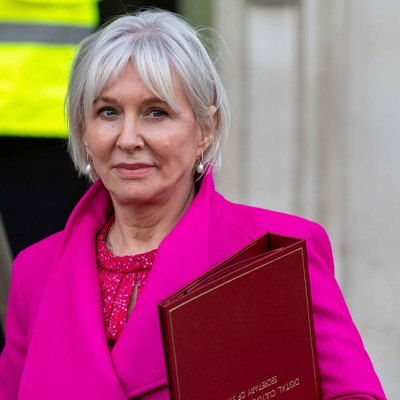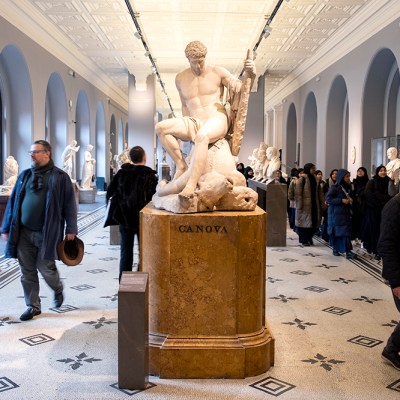When Lisa Nandy joked after her appointment as culture secretary that she was now the ‘minister for fun’, she was told by Chancellor Rachel Reeves: ‘Fun has been cancelled.’
It was certainly in short supply at Labour’s first party conference back in government this week. In spite of a defeat for the leadership in a conference vote, Labour is pressing ahead with its cuts to the winter fuel allowance, and Reeves warned of further ‘tough decisions’ in the budget. When Keir Starmer finally cracked a joke, about a heckler having ‘got a pass from the 2019 conference’, it seemed rather crass – the man had been speaking about children killed in Gaza.
But though Reeves has told ministers there’s no money left, Nandy was doing her best to at least offer good vibes in its place. She informed delegates that her ministerial team at the Department for Digital, Culture, Media and Sport (DCMS) would be the ‘light on the hill’ to bring opportunities back to Britain’s young people. She blasted the Tories for ‘running down the arts subjects, narrowing the curriculum and slashing council funding so parts of the country became cultural deserts’, and, invoking George Bernard Shaw, pledged to ‘reignite the imagination of the next generation’.
Upstream from the conference centre, the Merseyside Maritime Museum is set to close for three years from January. In many cities that would sound klaxons of doom amid the well-founded worries that it might not reopen at all, thanks to the parlous state of local government finance. But as a DCMS-sponsored body, National Museums Liverpool has an extra cushion of security, and the £58 million project to redevelop the Maritime Museum and International Slavery Museum is being greeted with enthusiasm.
Liverpool was therefore a fitting location for Nandy to declare that ‘the era of culture wars is over’, as she joined the Fabian Society for a fringe meeting about the future of the arts. She spoke frankly: ‘I think the arts sector is incredibly fragile at the moment. The pandemic obviously had a major impact, but there have been other problems as well: the inflation costs, a lot of our big national institutions are in buildings that are ageing and they’re struggling to be able to renovate.’
The Fabians have just published Arts for Us All, a new report putting forward proposals for how to fix Britain’s creative sectors. Having been given the culture brief only after shadow culture secretary Thangam Debbonaire lost her seat to the Greens, Nandy said she hadn’t read the report yet, but would be giving it due consideration soon.
In line with the Labour leadership’s fiscal dogma to date, the report contains nothing on the scale of the free museum entry introduced by the Blair government in 2001. There is little, other than a few education-based initiatives costed in the region of tens of millions, that would require a direct injection of tax revenues at all. Rather, the focus is on redeploying existing funds and reforming the tax system to better promote arts and culture. Museums and galleries could benefit from increasing the arts’ share of the National Lottery Distribution Fund from 20 to 25 per cent (at the expense of the community fund), and more money for the arts from the National Endowment for Science, Technology and the Arts (Nesta).
Research and development tax credits should be extended to the arts and humanities, the report says. Another intriguing proposal is to scrap VAT on art imports, noting a substantial drop in the UK’s share of the global art market after Brexit. In return, the report suggests that the British Art Market Federation ‘could ensure that a small percentage of every sale over an established threshold would go into a “pipeline” fund’ to support initiatives such as art school bursaries and studio spaces.
Nandy has already agreed to one proposal in the report, a review of Arts Council England, ‘because we will never accept that culture is just for the privileged few, to be hoarded in a few corners of the country, and we will never accept there is a trade off between excellence and access’. That kind of talk might make some institutions who have consistently received grants rather worried, but others will be confident they can demonstrate their national worth.
‘I’m a big supporter of the Arts Council,’ Nandy explained at the fringe meeting, ‘but I have seen too many examples of where the funding went into communities to fund things from outside the community, to be done to the community, not with the community, when there were already institutions there who could have done that much, much better, and made that money go much, much further.’
The Fabian Society suggests a tourist tax on hotels and tourist accommodation to support museums in cities across England, but the local government funding crisis, and its existing and future impact on museums and galleries, is largely missing from the report. But, having shadowed the communities brief in opposition, Nandy is all too aware of the realities facing museums funded by local government. ‘We’ve got lots of local institutions that have really suffered because of the collapse of council funding,’ she said. ‘We all know the example of the Oldham Coliseum, which was a theatre which my sister trained at, and which has a very special place in the life of our family. People across the country were absolutely devastated when it closed.’
She pointed to how this theatre is set to reopen thanks to a deal worked out between the town’s MP and the council, but had little to say about what she would do to step in if the museums in a big city such as Birmingham, which effectively declared bankruptcy last year, were to close. ‘We’ve commissioned some work to look at that, and particularly where we need to repurpose and redirect some of the money within the Department to help get some of the institutions through this very difficult period,’ she added.
Nandy also spoke of developing a ‘place-based philanthropy strategy’ to address the concentration of private donations on big institutions in major cities. ‘There are lots of examples of people who want to invest in their home towns, but there hasn’t been a proper network to enable that to flourish.’ She gave examples of Mike Danson, a ‘local maverick’ billionaire (and owner of the New Statesman), buying Wigan football and rugby club. But will museums and galleries, which cannot offer the outright control, potential profit or media profile that comes with sport, attract this kind of investment? More still, while some individual institutions have pulled off successful giving strategies, philanthropy as a whole has failed to make up for public spending cuts since 2010. Relying on this seems a hostage to fortune.
It’s even less likely that, more broadly, an approach based on rhetoric and re-focused spending priorities can offer life support to institutions on the brink — some of which won’t be able to sustain themselves until structural reforms like those in the Fabian report are implemented. Curators will be relieved to have a culture secretary who seems unlikely to start ticking off the National Trust or micro-managing museum displays, but vibes alone won’t pay the bills.



